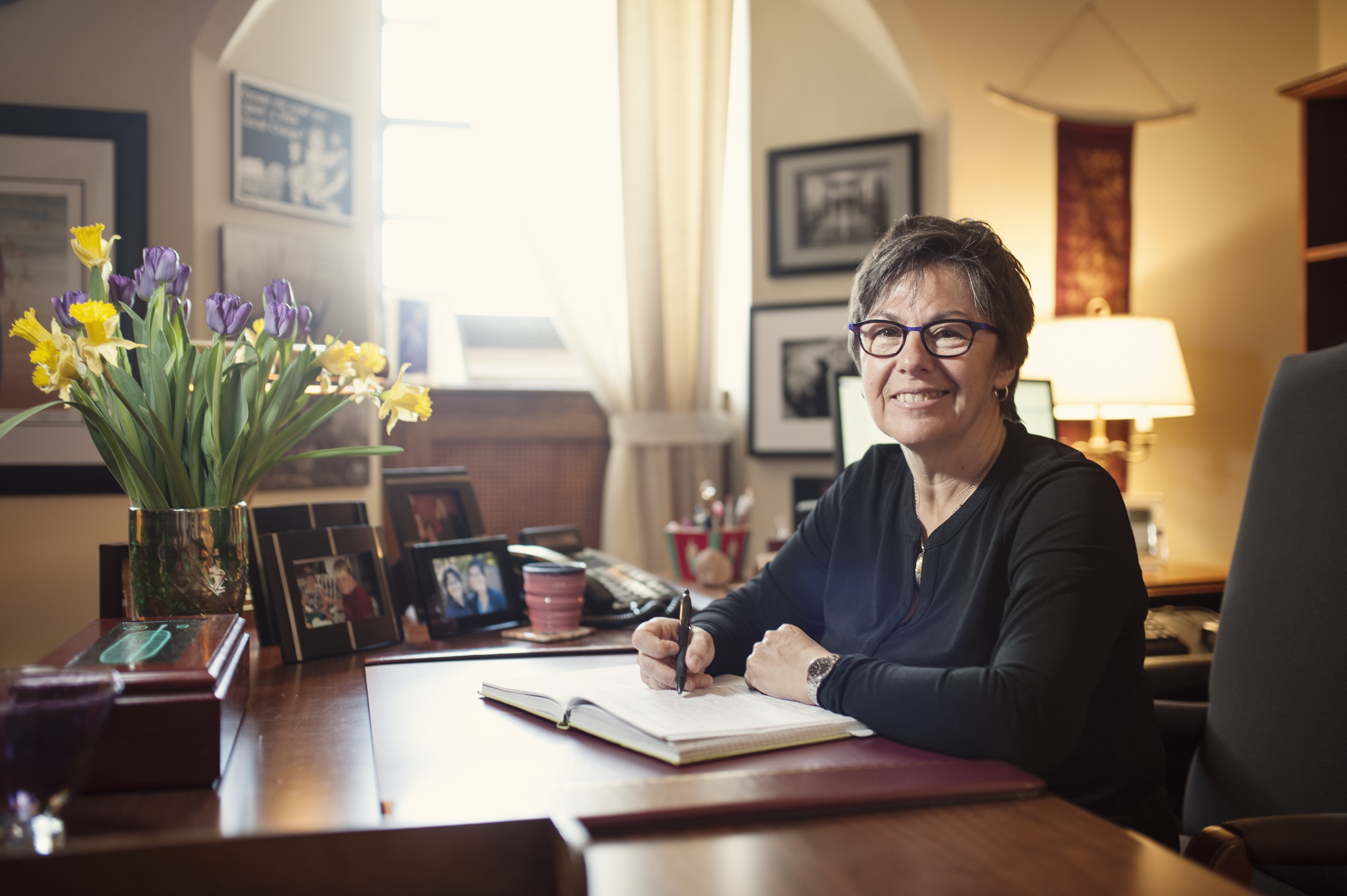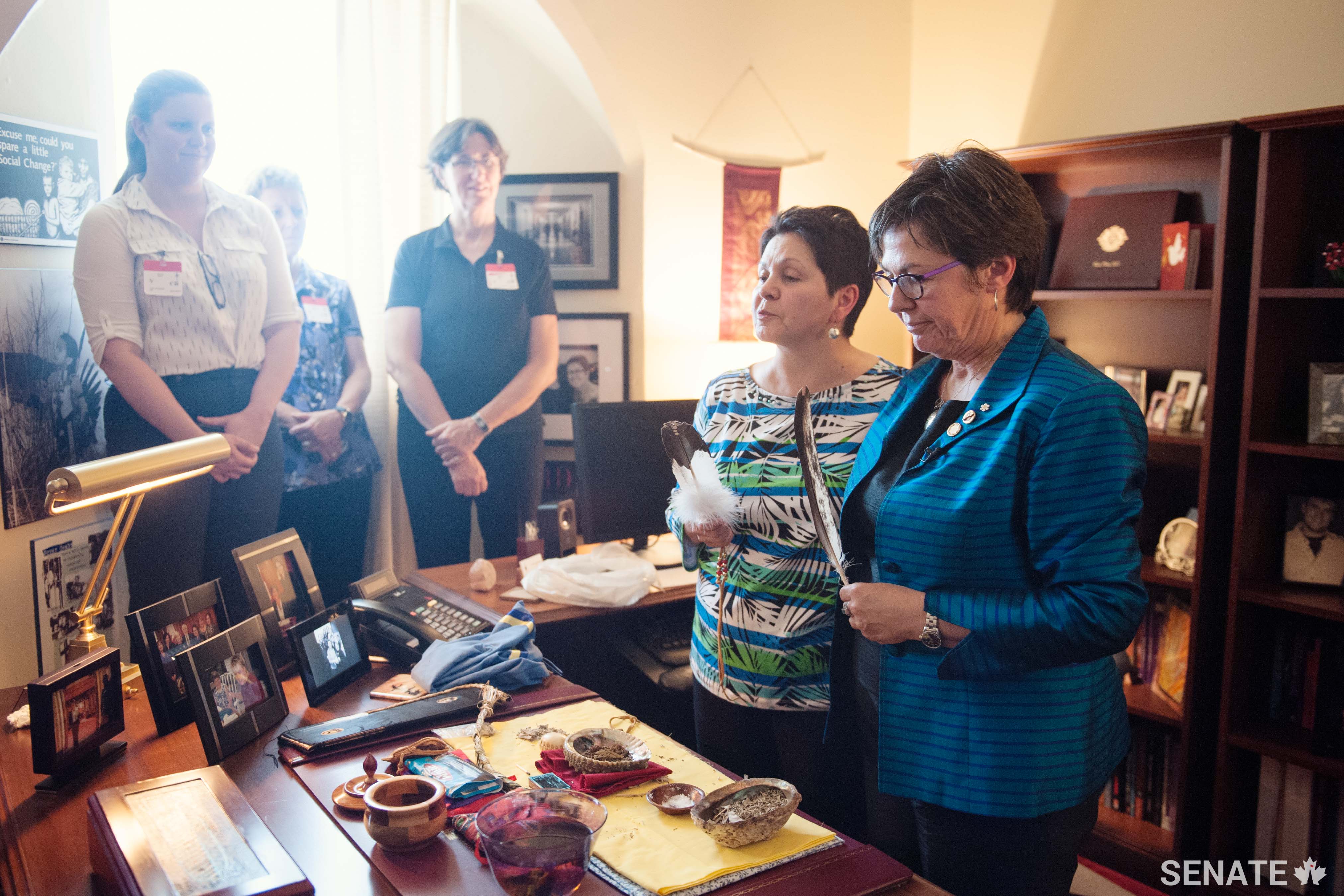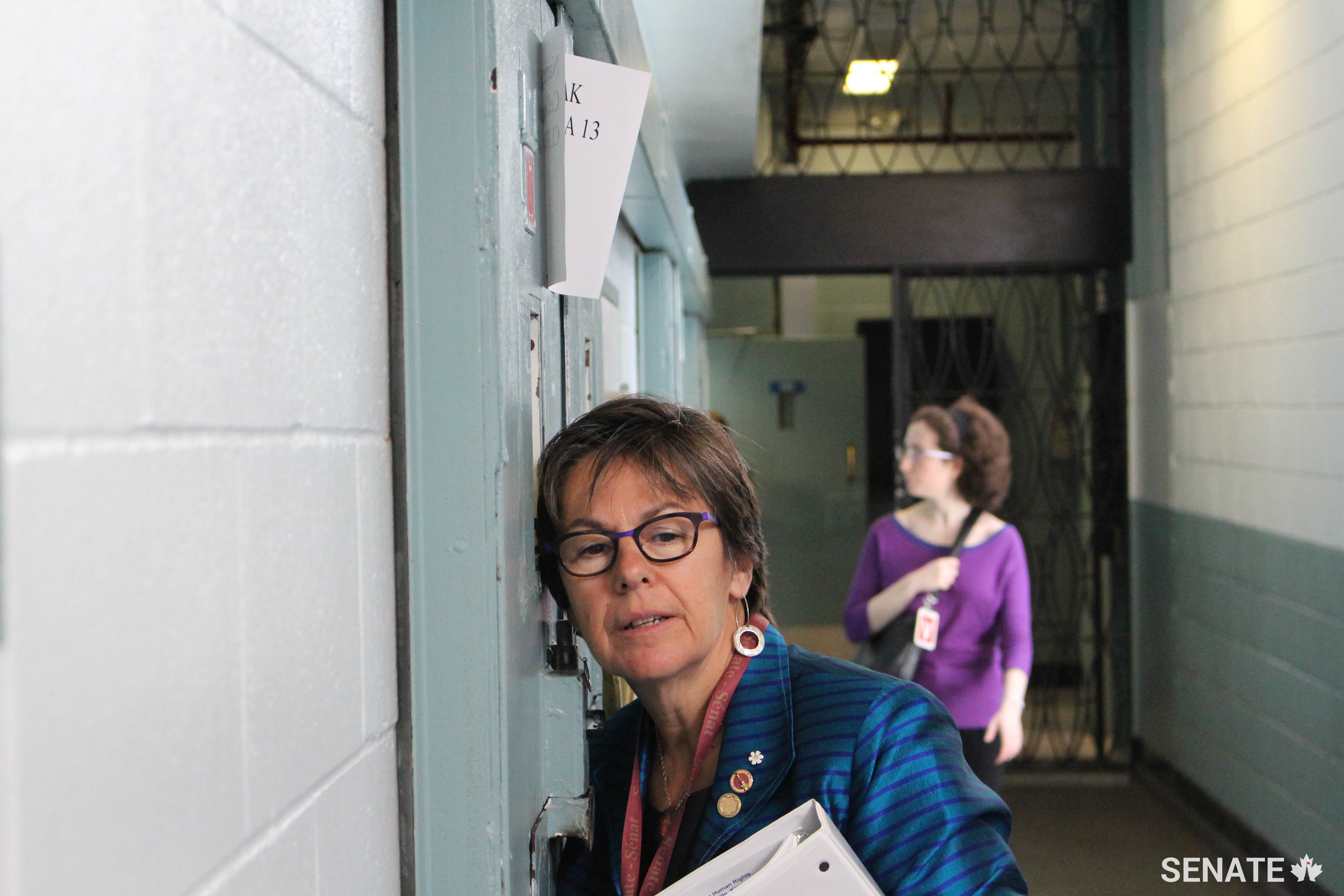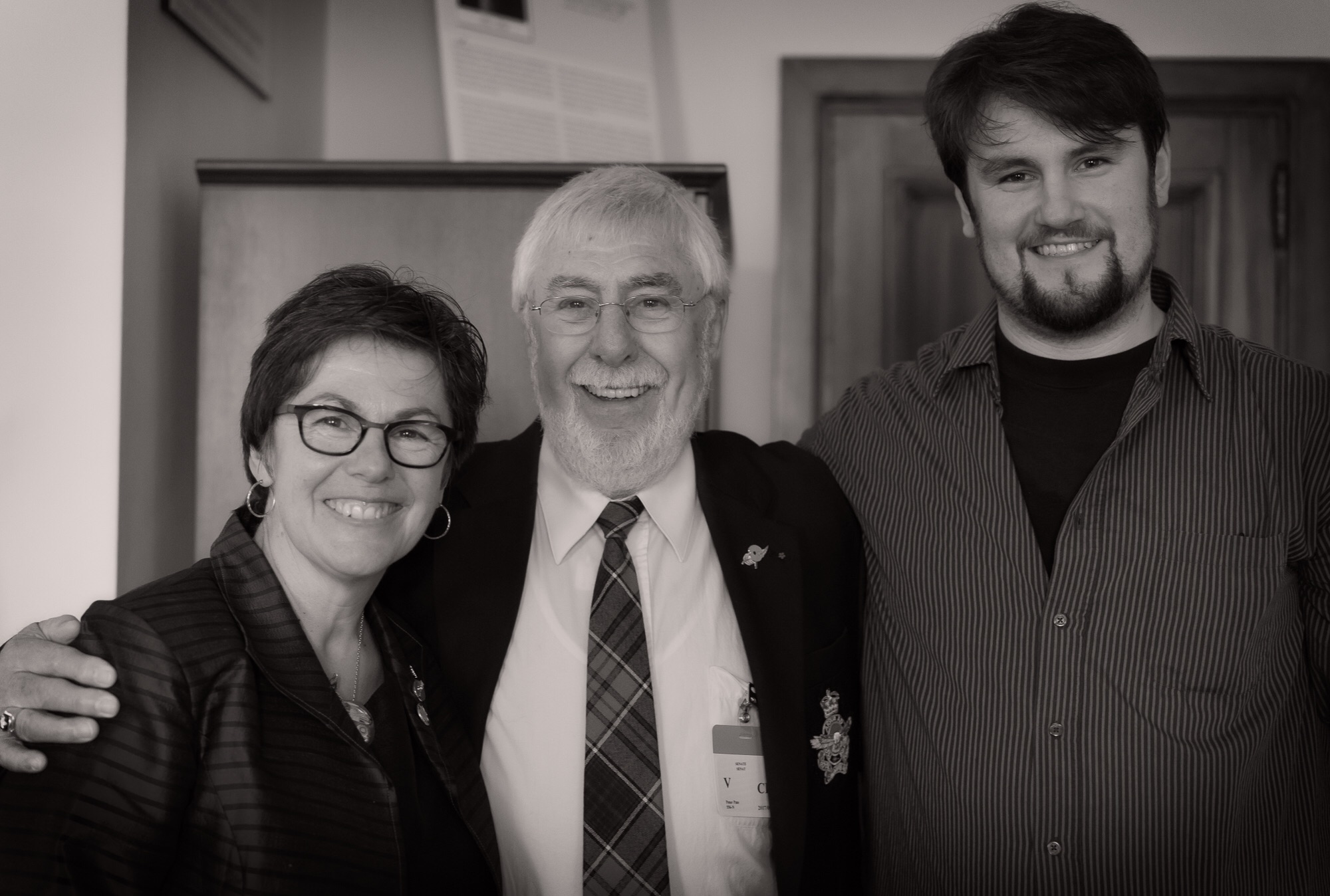Meet Senator Kim Pate

Kim Pate was appointed to the Senate of Canada on November 10, 2016. First and foremost the mother of Michael and Madison, she is also a nationally renowned advocate who has spent the last 35 years working in and around the legal and penal systems of Canada, with and on behalf of some of the most marginalized, victimized, criminalized and institutionalized — particularly imprisoned youth, men and women.

Who inspired you to get involved in public life?
I have had the opportunity and privilege to work with some of the most marginalized, victimized, criminalized and institutionalized in our country, most especially women and Indigenous peoples. I have been — and continue to be — inspired by their strength and resilience in the face of incredibly adversity. I’ve learned so much from each of them and feel privileged to have them in my life. I have also benefitted from a wide and deep circle of family, friends, allies, teachers and mentors who have taught me a tremendous amount about poverty, class biases, racism, sexism and other forms of inequality and discrimination, as well as the steps we can and must take to ensure all in Canada enjoy substantive equality.
On April 27, I had the privilege of hosting the ceremonial cleansing and opening of our Senate office, here, on unceded Algonquin territory. The ceremony was conducted by my good friend, co-activist, ally and mentor, Algonquin Elder Claudette Commanda and was attended by dear members of my wonderful circle of family, friends and allies — all colleagues in our collective work for justice, fairness and equality. It was humbling and an honour that so many people who inspire me and enrich my life were present. What a privilege and a gift.
I appreciate all who work to ensure that each one of us — everywhere and at all times — is entitled to freedom of want. Human rights are everyone's responsibility. Those of us with the privilege of position, power and/or resources have a lifelong responsibility to challenge discrimination and equality. If ever I flag or fail in this commitment and responsibility, then I believe that I should resign.
What do you think are the biggest public policy issues facing Canada today?
I believe that the most essential areas that need to be addressed include violence against women, discriminatory child welfare and protection services, the lack of economic, educational and employment opportunities, and many other serious issues related to discrimination, racism and so many other legacies of our history of colonization. Whether it be in policing, prosecutorial, immigration, judicial and correctional practices endured by many people, but most particularly those endured by First Nations, Inuit and Metis men, women and children, remedying wrongs and insisting on substantive equality must be our focus.
In terms of human, social and fiscal costs, prisons are the least effective and the most costly means of responding to substantive inequality and injustice. Our history of racism, sexism and classism means that our jails and prisons are increasingly becoming our default replacement for eviscerated social safety nets, health and education systems. Jails should not substitute as shelters for battered women, nor are they treatment or mental health centres, and they most certainly are not appropriate responses to inadequate housing and social services.
We need to breathe life into the equality provisions that are laid out in our Canadian Charter of Rights and Freedoms. It is a tall order, but one I know that working together, we can achieve. This will be my objective in this place.

Why should more Canadians care about what happens in the Senate?
I believe that this question can easily be turned around. As Senators, we must care about what happens to Canadians throughout this country. We should set the bar high when it comes to exemplary behaviour. Heaven knows that we all make mistakes — I’ve made more than most, I’m sure — but there are only 105 such positions in Canada, and I believe that it is our privilege and duty to work and live in a way that is beyond reproach, both professionally and in our personal lives.
When Prime Minister Trudeau called to ask me to join the Senate of Canada, he told me that it was the activism and type of work that I’ve spent my life doing that was needed in the Government of Canada. I don’t remember much of what was said after that, but right then and there I knew that I had been afforded an incredible opportunity and privilege to champion the issues that I hold dear in a forum like no other.
Truly, if the Senate had not been evolving the way that it has been, I would not have been interested in becoming a Senator. It was the opportunity to work within a non-partisan, independent and informed manner that attracted me to this position. I believe that each and every one of us in this place needs to utilize our independent expertise to inform the best collective action that serves the interests of all Canadians. We have a responsibility to work with and for those whose voices are too often not heard or, worse still, silenced or ignored.
What legislative or committee work are you most proud of participating in to date?
Before coming to the Senate, I spent a fair amount of time appearing as a witness before the Senate Committee on Legal and Constitutional Affairs, so it is fascinating to now be a member of the committee.
I am also learning a great deal as a member of the Senate Committee on Aboriginal Peoples, particularly as we work on building productive nation-to-nation relationships amongst all treaty people in Canada. At our committee meetings, I have the privilege of working with and learning from those who have experienced the continuing effects of our country’s legacy of racist and sexist inequality and colonialism and who have dedicated themselves to helping Canada to become a place of justice, fairness and equality for all. Recently, the committee has been tasked with reviewing legislation that was supposed to be aimed at eliminating sex-discrimination in the Indian Act. I am proud of how the committee has used this process to push for a more comprehensive response from the government. It is my hope that the committee will keep this awareness of the need to redress systemic marginalization of Indigenous women at the heart of its work.
I am also very pleased to have joined the Senate at a time when the Senate Committee on Human Rights was deciding to undertake a review of prisons. I cannot imagine a more sympatico connection between my life’s work and my new role as a Canadian Senator.
Can you name a guilty pleasure song / album that always makes you smile and why?
When my kids were younger, they were each asked — albeit in different contexts — by teachers to pick a song that described their mother. Michael chose Imagine by John Lennon, and Madison picked Revolution by Tracy Chapman. Not surprisingly, those two songs consequently hold a very special place in my heart.

What is the last book you read or movie you saw which you recommended to someone else and why?
The last movie I saw was Hidden Figures, and it was incredible! We should all be horrified that the true life story of the incredibly brilliant Katherine Johnson, Dorothy Vaughan and Mary Jackson, and probably other African-American women, who served as the genius and brains behind human travel into space was disappeared for so many decades. Had it not been for the movie, too many would never have known of this incredible story of misogyny and racism that those amazing women endured. The leadership of women, particularly poor and racialized women, has long been ignored, rewritten or appropriated, especially by the more privileged. For me, Hidden Figures was a reminder of the need to revitalize institutions that have become, as my Maori friends recently framed them, “male, pale and stale”.
What sports team (amateur/professional) do you support?
I’ve always loved to watch my children play sports. Michael played football and rugby as he was growing up and is now an incredibly knowledgeable outdoorsman. Madison plays rugby, hockey and football and has quite the competitive streak. I enjoy swimming, running and biking for fun.
Why are you proud to be Canadian?
By defending the most basic of human rights, we reaffirm our humanity. I’ve always felt that it was both my duty and a tremendous privilege to work, walk and advocate with and on behalf of some of the most marginalized, victimized, criminalized and institutionalized in our country. During my career, I’ve had the opportunity to draw upon the experiences of many other countries in this respect and it has always been my hope that it is Canada that will set the bar high – that it is we who will be world leaders when it comes to equality and social justice. We have a lot of work to do, and I am proud to be continuing this work for the next 18 years that I will be here.
Canada is a rich country in terms of our human, capital and natural resources. We have an opportunity to be world leaders with respect to equality and human rights, and we have a responsibility to operate in a way that would have us be the envy of other countries. I am grateful to have the opportunity to continue this work with my Senate colleagues on behalf of all Canadians.
Thank you! Merci! Meegwetch!
Related articles
Tags
Committee news
Meet Senator Kim Pate

Kim Pate was appointed to the Senate of Canada on November 10, 2016. First and foremost the mother of Michael and Madison, she is also a nationally renowned advocate who has spent the last 35 years working in and around the legal and penal systems of Canada, with and on behalf of some of the most marginalized, victimized, criminalized and institutionalized — particularly imprisoned youth, men and women.

Who inspired you to get involved in public life?
I have had the opportunity and privilege to work with some of the most marginalized, victimized, criminalized and institutionalized in our country, most especially women and Indigenous peoples. I have been — and continue to be — inspired by their strength and resilience in the face of incredibly adversity. I’ve learned so much from each of them and feel privileged to have them in my life. I have also benefitted from a wide and deep circle of family, friends, allies, teachers and mentors who have taught me a tremendous amount about poverty, class biases, racism, sexism and other forms of inequality and discrimination, as well as the steps we can and must take to ensure all in Canada enjoy substantive equality.
On April 27, I had the privilege of hosting the ceremonial cleansing and opening of our Senate office, here, on unceded Algonquin territory. The ceremony was conducted by my good friend, co-activist, ally and mentor, Algonquin Elder Claudette Commanda and was attended by dear members of my wonderful circle of family, friends and allies — all colleagues in our collective work for justice, fairness and equality. It was humbling and an honour that so many people who inspire me and enrich my life were present. What a privilege and a gift.
I appreciate all who work to ensure that each one of us — everywhere and at all times — is entitled to freedom of want. Human rights are everyone's responsibility. Those of us with the privilege of position, power and/or resources have a lifelong responsibility to challenge discrimination and equality. If ever I flag or fail in this commitment and responsibility, then I believe that I should resign.
What do you think are the biggest public policy issues facing Canada today?
I believe that the most essential areas that need to be addressed include violence against women, discriminatory child welfare and protection services, the lack of economic, educational and employment opportunities, and many other serious issues related to discrimination, racism and so many other legacies of our history of colonization. Whether it be in policing, prosecutorial, immigration, judicial and correctional practices endured by many people, but most particularly those endured by First Nations, Inuit and Metis men, women and children, remedying wrongs and insisting on substantive equality must be our focus.
In terms of human, social and fiscal costs, prisons are the least effective and the most costly means of responding to substantive inequality and injustice. Our history of racism, sexism and classism means that our jails and prisons are increasingly becoming our default replacement for eviscerated social safety nets, health and education systems. Jails should not substitute as shelters for battered women, nor are they treatment or mental health centres, and they most certainly are not appropriate responses to inadequate housing and social services.
We need to breathe life into the equality provisions that are laid out in our Canadian Charter of Rights and Freedoms. It is a tall order, but one I know that working together, we can achieve. This will be my objective in this place.

Why should more Canadians care about what happens in the Senate?
I believe that this question can easily be turned around. As Senators, we must care about what happens to Canadians throughout this country. We should set the bar high when it comes to exemplary behaviour. Heaven knows that we all make mistakes — I’ve made more than most, I’m sure — but there are only 105 such positions in Canada, and I believe that it is our privilege and duty to work and live in a way that is beyond reproach, both professionally and in our personal lives.
When Prime Minister Trudeau called to ask me to join the Senate of Canada, he told me that it was the activism and type of work that I’ve spent my life doing that was needed in the Government of Canada. I don’t remember much of what was said after that, but right then and there I knew that I had been afforded an incredible opportunity and privilege to champion the issues that I hold dear in a forum like no other.
Truly, if the Senate had not been evolving the way that it has been, I would not have been interested in becoming a Senator. It was the opportunity to work within a non-partisan, independent and informed manner that attracted me to this position. I believe that each and every one of us in this place needs to utilize our independent expertise to inform the best collective action that serves the interests of all Canadians. We have a responsibility to work with and for those whose voices are too often not heard or, worse still, silenced or ignored.
What legislative or committee work are you most proud of participating in to date?
Before coming to the Senate, I spent a fair amount of time appearing as a witness before the Senate Committee on Legal and Constitutional Affairs, so it is fascinating to now be a member of the committee.
I am also learning a great deal as a member of the Senate Committee on Aboriginal Peoples, particularly as we work on building productive nation-to-nation relationships amongst all treaty people in Canada. At our committee meetings, I have the privilege of working with and learning from those who have experienced the continuing effects of our country’s legacy of racist and sexist inequality and colonialism and who have dedicated themselves to helping Canada to become a place of justice, fairness and equality for all. Recently, the committee has been tasked with reviewing legislation that was supposed to be aimed at eliminating sex-discrimination in the Indian Act. I am proud of how the committee has used this process to push for a more comprehensive response from the government. It is my hope that the committee will keep this awareness of the need to redress systemic marginalization of Indigenous women at the heart of its work.
I am also very pleased to have joined the Senate at a time when the Senate Committee on Human Rights was deciding to undertake a review of prisons. I cannot imagine a more sympatico connection between my life’s work and my new role as a Canadian Senator.
Can you name a guilty pleasure song / album that always makes you smile and why?
When my kids were younger, they were each asked — albeit in different contexts — by teachers to pick a song that described their mother. Michael chose Imagine by John Lennon, and Madison picked Revolution by Tracy Chapman. Not surprisingly, those two songs consequently hold a very special place in my heart.

What is the last book you read or movie you saw which you recommended to someone else and why?
The last movie I saw was Hidden Figures, and it was incredible! We should all be horrified that the true life story of the incredibly brilliant Katherine Johnson, Dorothy Vaughan and Mary Jackson, and probably other African-American women, who served as the genius and brains behind human travel into space was disappeared for so many decades. Had it not been for the movie, too many would never have known of this incredible story of misogyny and racism that those amazing women endured. The leadership of women, particularly poor and racialized women, has long been ignored, rewritten or appropriated, especially by the more privileged. For me, Hidden Figures was a reminder of the need to revitalize institutions that have become, as my Maori friends recently framed them, “male, pale and stale”.
What sports team (amateur/professional) do you support?
I’ve always loved to watch my children play sports. Michael played football and rugby as he was growing up and is now an incredibly knowledgeable outdoorsman. Madison plays rugby, hockey and football and has quite the competitive streak. I enjoy swimming, running and biking for fun.
Why are you proud to be Canadian?
By defending the most basic of human rights, we reaffirm our humanity. I’ve always felt that it was both my duty and a tremendous privilege to work, walk and advocate with and on behalf of some of the most marginalized, victimized, criminalized and institutionalized in our country. During my career, I’ve had the opportunity to draw upon the experiences of many other countries in this respect and it has always been my hope that it is Canada that will set the bar high – that it is we who will be world leaders when it comes to equality and social justice. We have a lot of work to do, and I am proud to be continuing this work for the next 18 years that I will be here.
Canada is a rich country in terms of our human, capital and natural resources. We have an opportunity to be world leaders with respect to equality and human rights, and we have a responsibility to operate in a way that would have us be the envy of other countries. I am grateful to have the opportunity to continue this work with my Senate colleagues on behalf of all Canadians.
Thank you! Merci! Meegwetch!


